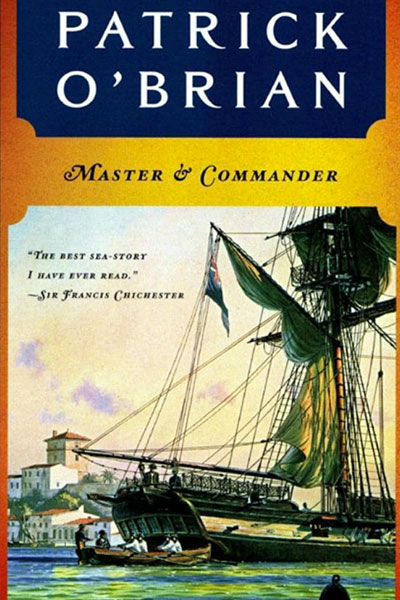5 Books for Old-Fashioned Adventure in the 19th Century
 Maybe it’s the smell of gunpowder, or the flashy fashions, or the fact that hipster-ish facial hair was considered absolutely required, but nothing quite says adventure like a good romp through the 19th century, especially the early bits when Napoleon was threatening to turn the world into all the worst parts of France. This was a time of derring-do, forced boarding of ships, and terrible, awful food. Which might explain why everyone was so eager to have adventures: it beat sitting at home feeling nauseous all the time. If you yearn for a good adventure that includes a lot of risky behavior in a time before anesthetic or any concept of germs, these are the five books and series you should be reading:
Maybe it’s the smell of gunpowder, or the flashy fashions, or the fact that hipster-ish facial hair was considered absolutely required, but nothing quite says adventure like a good romp through the 19th century, especially the early bits when Napoleon was threatening to turn the world into all the worst parts of France. This was a time of derring-do, forced boarding of ships, and terrible, awful food. Which might explain why everyone was so eager to have adventures: it beat sitting at home feeling nauseous all the time. If you yearn for a good adventure that includes a lot of risky behavior in a time before anesthetic or any concept of germs, these are the five books and series you should be reading:
The Aubrey/Maturin Series, by Patrick O’Brian
Ideal For: Anyone who thinks they can eat a meal of salted beef and ersatz coffee and then swing onto an enemy ship and shoot someone in the face with aplomb.
If you’ve ever wondered what every single line of rope on a 19th-century warship was called and what it did, simply read these 20 novels and you’ll be able to make obscure seafaring jokes with the best of them. Interspersed with this detailed examination of life on the sea during wartime are sea battles, boardings, raids, romance, intrigue, and perhaps the worst weevil-based joke ever committed to paper. O’Brian packed in more adventure on the high seas and all over the world than most people will experience in their entire lives.
The Flashman Books, by George MacDonald Fraser
Ideal For: Anyone who finds themselves identifying with the villain and wondering why they’re never the star of the show, because they’re more fun.
Harry Flashman, originally a minor character in Tom Brown’s School Days, is perhaps the worst human being ever invented. A coward, braggart, adulterer, and overall weasel, he uses a sharp mind, a head for languages, and an almost magical ability to be in the right place at the right time to somehow come through all his adventures looking like a brave, dashing hero instead of the cretin he actually is. Structured as a collection of diaries discovered by the author that reveal the truth behind the fictional heroics, there’s a healthy dose of actual adventure in each story—made more exciting by Harry’s whimpering cowardice, which more of us identify with than we might want to admit.
Horatio Hornblower Series, by C.S. Forester
Ideal For: Anyone who enjoys straightforward heroism that is approached as a duty and a necessity instead of something to be celebrated and sought after.
Horatio Hornblower is one of the most complex characters you’ll find in any story set during the Napoleonic Wars. Equal parts socially awkward, heroic, and self-pitying, he’s the sort of adventurer who never thinks of himself as up to the task at hand or as particularly heroic. Hornblower simply does his duty to the best of his ability and thus is heroic by default, in a series of stories that takes him all over the world and involves him in plenty of adventures with high stakes and real costs.
The Sharpe Novels, by Bernard Cornwell
Ideal For: Anyone who gets sick and tired, sometimes, of every hero in a historical adventure being of the officer or aristocratic class.
Richard Sharpe is, at the beginning of his lengthy story, a hardscrabble survivor in a rough army serving in an even rougher time period. From a poor orphan to the sort of desperate soldier wearing a threadbare uniform and constantly at the mercy of superiors who purchased their commissions and know much less about war than he does, he approaches all of his adventures with the sincerity of the desperate, and you kind of love him for it.
The Kydd Novels, by Julian Stockwin
Ideal For: Anyone who gets sick and tired, sometimes, of every story about the British Navy being about the officers.
Stockwin’s Kydd books are technically set in the 18th century for the first six books, but they begin in 1793, so we’ve ruled it Close Enough. Refreshingly, it explores the experience of a “pressed” man, someone forced into the British Navy against his will, which wasn’t uncommon back in an age when manpower was desperately needed to fight a seemingly endless war. That doesn’t mean it’s all about eating moldy bread and endlessly scrubbing the decks with stones—there’s plenty of adventure, just from the point of view of the literal cannon fodder instead of the officers.
Are you in the mood for an old-timey adventure?